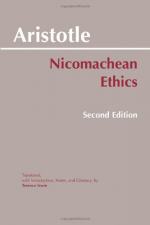
|
| Name: _________________________ | Period: ___________________ |
This test consists of 5 multiple choice questions, 5 short answer questions, and 10 short essay questions.
Multiple Choice Questions
1. When do people eat snacks the most in theaters, according to Aristotle in X.5?
(a) When the actors are bad.
(b) When there is no dialogue.
(c) When there is a lot of dialogue.
(d) When the actors are good.
2. Aristotle states that food is more pleasant than gold to what?
(a) A child.
(b) A wealthy man.
(c) A donkey.
(d) A philosopher.
3. For what sort of living environment does Aristotle say the human being is meant in IX.9?
(a) Urban.
(b) Rural.
(c) Suburban.
(d) Nomadic.
4. Which of the powers of the soul that Aristotle claims is used to disclose truth is directed at the sources of truth?
(a) Wisdom.
(b) Practical judgment.
(c) Knowledge.
(d) Intellect.
5. What two things does Aristotle state are linked together in the beginning of X.8?
(a) Moral virtue and art.
(b) Moral virtue and wisdom.
(c) Practical judgment and moral virtue.
(d) Practical judgment and feelings.
Short Answer Questions
1. About what, concerning the virtues, might one raise a problem, as Aristotle states in VI.12?
2. Near the end of X.3, Aristotle says that no one would choose to live their lives having the thinking of what sort of person?
3. As Aristotle says in X.3, according to some people, if pleasure is not classed among qualities, it is also not classed among what?
4. How many senses of the word "good" does Aristotle discuss in VII.12?
5. With what power of the soul does Aristotle state that astuteness shares its concern?
Short Essay Questions
1. Through the possession of what virtue, according to Aristotle, is man said to have possession of all the intellectual virtues, at least to some degree, and why?
2. Explain the three sorts of friendship described in Book VIII.
3. Why does Aristotle state that words concerning feelings and actions are less believable than actions themselves?
4. What does Aristotle intend to convey by comparing vice to the disease of consumption (tuberculosis)?
5. Explain Aristotle's distinction between affection and friendship.
6. What characterizes the blame put upon people who are in animal-like conditions, according to Aristotle's perspective?
7. In what way, for Aristotle, do the pursuits of actions in accord with the virtues that pertain to politics and war differ from those that pertain to contemplation?
8. Why does Aristotle state that mothers have greater love for their children than children for their parents?
9. What is one reason Aristotle gives for which someone ought not to treat former friends in some way different than strangers if the friendship was dissolved to to an excess of vice?
10. What would it mean, for Aristotle, to describe a sort of friendship as being a hybrid?
|
This section contains 984 words (approx. 4 pages at 300 words per page) |

|




